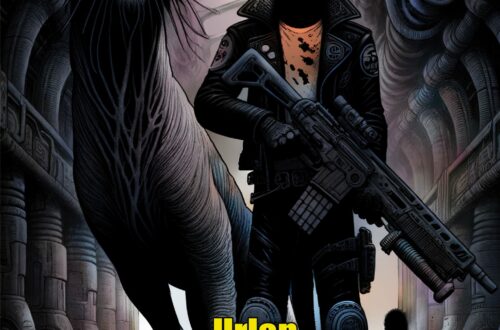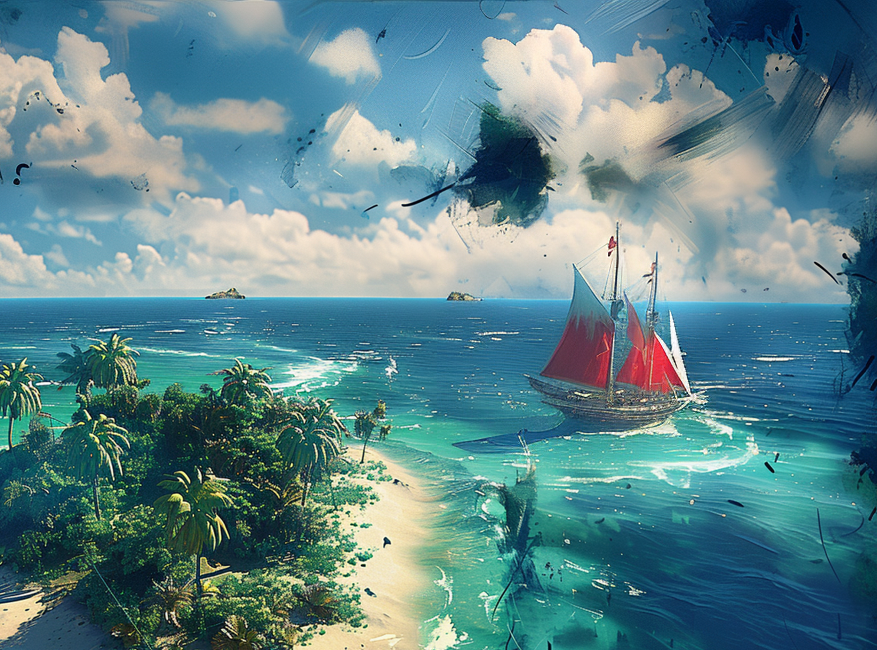
The Isle of San Brandán
The Canary Island which comes and goes
The Uncharted: “San Brandán Island”
Last December, a photo was taken of the mysterious Island of San Brandán, by Gabriel Hernández Pages. Here you can read the article.
Saint Brandán was a fearless monk and explorer who, according to V century manuscripts, stumbled upon a mysterious island that was unlike any land known to man. Described as an enormous fish that masqueraded as terra firma, this island held secrets that were as vast as the ocean itself. For centuries, it has been sighted and called the Eighth Canary (until 2018, the Canaries were officially seven, as La Graciosa was part of Lanzarote).
The mythical island re-emerged from the Atlantic on the evening of December 10, 2023, reinforcing the legend and sparking a debate between it being an optical effect or an unresolved mystery. 66 years after Manuel Rodríguez Quintero first photographed the mysterious island of San Borondón, as it’s called in Spanish, off the coast of La Palma Island (Canarias). That image was published in 1958 in the ABC newspaper of Madrid.
On December 10, 2023, Gabriel Hernández Pages captured a snapshot at sunset in Los Llanos de Aridane, La Palma, where you can see, to the right of El Hierro island and the mountains of Todoque and La Laguna, what indeed appears to be the outline of a territory that juts out on the horizon. Interestingly, the archaeologist Nuria Álvarez Rodríguez was among the onlookers, the great-granddaughter of Manuel Rodríguez Quintero, the author of the first image of the island that “comes and goes.” Once again, everyone gathered there saw, with amazement and disbelief, what appeared to be an island on the western horizon. One of the bystanders commented, “In that part of the ocean, there is no island, and all of us who were there taking images of the spectacular sunset, just saw it…”
This enchanting legend weaves the forgotten lore of an island that defies the ordinary, appearing and disappearing in the vast Atlantic Ocean at will, a marvel that has captivated the imagination of seafarers and adventurers through the ages.
I’ve just stumbled into the news, but looking back, I realized I was writing the following short story right in those December days. Synchronicity?
This is an homage to the tales of old, where maps ended with the phrase “Here Be Dragons”. It invites readers to set sail on a journey to discover what lies beyond the edges of our understanding, to a place that exists in the whispers of mariners and the pages of forgotten journals.
And here, I want to give it to you. Enjoy the reading!
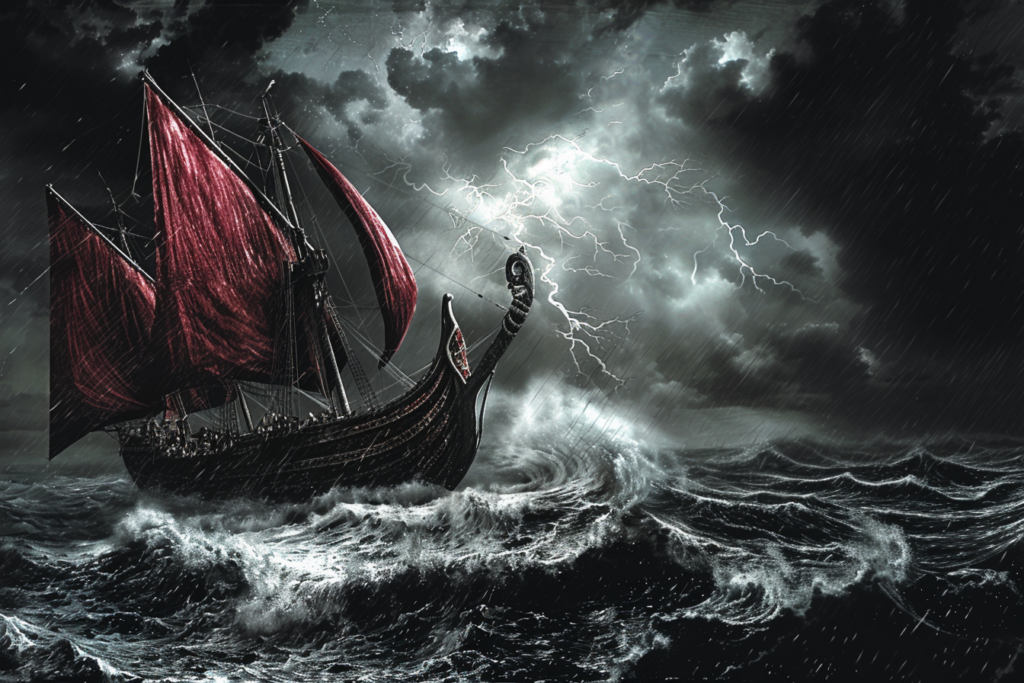
The Isle of San Brandán
Ugolino Vivaldi—Ugo for everyone—watches his brother Vadino chatting with the ship’s surgeon.
They’re pointing to the convicts and trying to figure out who’s still alive and who, among these, is still able to row.
Vadino had been demoted to second captain after the loss of the Sant’Antonio, Ugo’s ship. No one had complained and Ugo had not let any space for discussion anyway.
He straightens his wet jacket and tries to take command without giving too much weight to all they have been through. Genoa seems so far away and losing the second galley would mean death for everyone. Ugo does not want the crew to dwell too much on this possibility.
“Vadino! Come!” Ugo calls.
Vadino Vivaldi takes the few steps that separate him from his brother.
“Tell me, Ugo, what?”
“Water is running out, we have to head to the Fortunate Islands,” declares Ugolino. Not that his brother can say something about it. It has always been so, since childhood: Ugo informs Vadino of everything, but decisions are up to him.
“As you wish. Ugo, we are all exhausted, I don’t think there can be a better choice. The nearest is the small one: Herò. It has plenty of water but little food,” Vadino replies.
Ugo looks at him with a lowered eyebrow and heads without any more word to the cook’s cabin. He wants to know exactly how they are with food, how much they have available.
He goes down the narrow wooden staircase, after the first few steps he gets the pungent smell of the rowers mixed with that of the sea air. He quickly passes the rows without lowering his eyes and peeps into the cook’s nest.
“Tano, can I talk to you for a minute?”
Tano grunts. He is preparing a soup, probably a very diluted mesciua, Ugo sees the chickpeas floating with the beans and sardines, few in truth. Ugo’s gaze lingers on the shelf in the corner, above Tano’s bunk, precisely on the cloth wrap placed there. He looks away, Tano is staring at him. “How are we with supplies? Can we get to the Fortunate Islands?”
Tano shrugs indicating a yes with his head.
“Good, today be generous with the hardtack, give an extra ration to everyone, too, even the convicts.”
The captain returns to the deck with a quick step, takes his place under his tent, exchanges a few words with Puccio, the comitus, who turns and yells at the crew: “Full speed ahead!”
There are some chatters in the background, some grumbles. The aguzzino—the overseer of the convict rowers—nods, replies “yesssir” to Puccio, then gets to his dirty work and the galley sets off again.
Herò is still far away. The galley is heading North East. They have been pushed by the currents and the storm too far to the West and the coasts of Africa have been invisible for many days now.
It doesn’t matter much, Africa had been inhospitable to them. Inhabitants hostile to any form of commerce, little drinking water, scarce food. Circumnavigating Africa, replenishing from landing to landing was their initial idea, the project of the Vivaldi brothers, but after passing Mauretania and the kingdom of the Berber Merinids, it had been a constant frustration. No way to continue the journey without opportunity to resupply. The sailors had gathered and had wanted to talk about this enterprise, about this new route to the Indies. There had been discussion, strong, altered tones:
“It’s too big a land! We had to pass from the the North!”
Ugo had smelled a mutiny. His brother was useless, he couldn’t keep the Allegranza’s crew in check and Ugo had been forced to abandon the Sant’Antonio after their men were decimated by scurvy and governing two ships had become impossible. A disaster he didn’t need, they had to come back as losers, they would be called cowards.
And now they are aiming at the Fortunate Islands, the Canaries, leaving behind the idea of the new route through the Black Land.
Ugo hasn’t lost hope yet: perhaps, making a stop in the Canaries, recovering food and water in that hospitable land, they might be able to continue with the Allegranza, him as the head and his brother as the second. It isn’t over just yet.
We’ll try.
Vadino, lost in his thoughts, observes the Ocean. So quiet now. The waves look like sheets spread on the bed, just pulled in by Tessa, their housekeeper, after a day drying in the sun. In the distance he spots a group of animals, they are dolphins, or maybe whales. Too small to be whales. They approach the ship. They seem curious about the movement of the oars in the water. They have a flattened, round snout like a full moon, they must be a dozen and they are dark. Vadino points out the beasts to his brother, but Ugo is talking to Puccio and doesn’t listen to him.
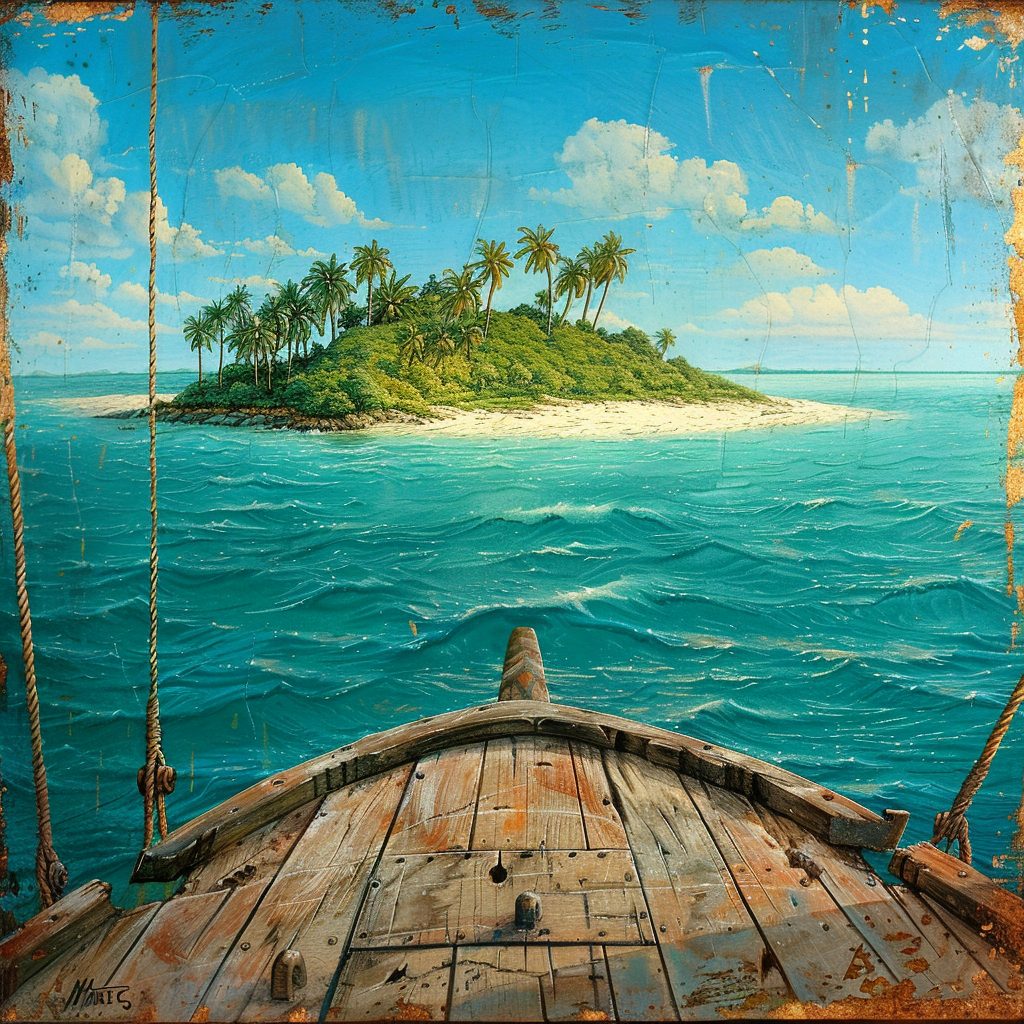
II.
“Vadino! Come here! Look! Is that Herò? Puccio! Puccio, come too!”
There’s an island on the horizon, but it doesn’t look like the smallest of the Canaries. It’s flat, solitary with a wide beach of white sand that shines in the sun surrounded by lush vegetation. The sea all around is calm and there are no rocks on the seabed.
“It doesn’t look like Herò,” Puccio speaks as he approaches the group scrutinizing the island.
“It’s the island of San Brandán!” Vadino is excited. “Ugo! It’s the island of the friar explorer!”
Ugo remembers his brother, ten years younger, talking about his discoveries in books, his mysterious islands, including the island of the seagoing friar, Brandán el Navegante—the Navigator. A magical island that appears and disappears, southwest of the Canaries, or Madeira, where exactly is unknown. There are few tales and maps, things certain—none.
“But Vadino, are you sure? Puccio, did you make a wrong route?” Puccio is perplexed.
“I’m sure!” Vadino shouts, “it’s just as Brandán described it when he visited it, and it’s located exactly where he said, and it’s right in front of us, welcoming us,” he smiles blissfully, his courage popping up suddenly from who knows where and he has eyes only for her, the island.
“Puccio, what do you say: shall we stop?” Ugo asks.
“I don’t know, captain. In my opinion, it’s better to proceed to Herò. This island here, we do not know it.”
“But how? And do we call ourselves ‘explorers’? Can the fear of the unknown prevent us from visiting such a special island?” Vadino bursts out, annoyed.
And Ugo responds: “Alright then, let’s drop anchor and disembark. And let’s get these wretches to stretch their legs a bit!”
Ugo prepares to disembark and goes down again to the kitchen cubbyhole. He wants to exchange a few words with the cook.
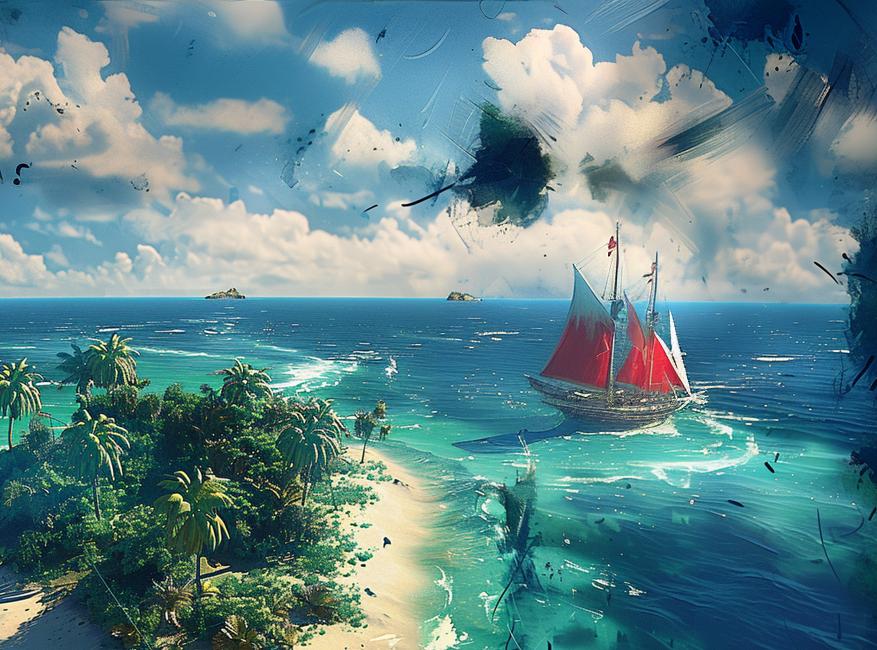
“Tano, you come too, we’re going to the skiffs.”
Tano grunts something in disapproval.
“Take it with you,” says Ugo and nods at the wrap on the shelf.
Tano looks at him, silent, his cerulean and tired eyes fixed on the captain’s. He looks him up and down, his dirty beard towers over Ugo’s hair. He’s not sure he understood, he doesn’t open his mouth, he doesn’t blink. The men’s laughter comes from outside. They’re preparing tools, knives, barrels to go to this new island. They’re happy, they want to disembark, they’re singing.
Ugo keeps his eyes fixed on him, takes a deep breath.
“Tano. Just in case. I would be more at ease.”
III.
A sinister whisper rises from the forest, a mournful echo which entwines with the wind.
Vadino looks around. His brother waits for him at the camp they’re setting up, his fifteen men are foraging for water and fruit, baskets and skins filled already. The island is lush. They have been lucky. They should return to the camp with the others, but he wants to venture further and reach a vantage point. There are some rocks in the distance that look like stone bell towers, from there he could see the whole island.
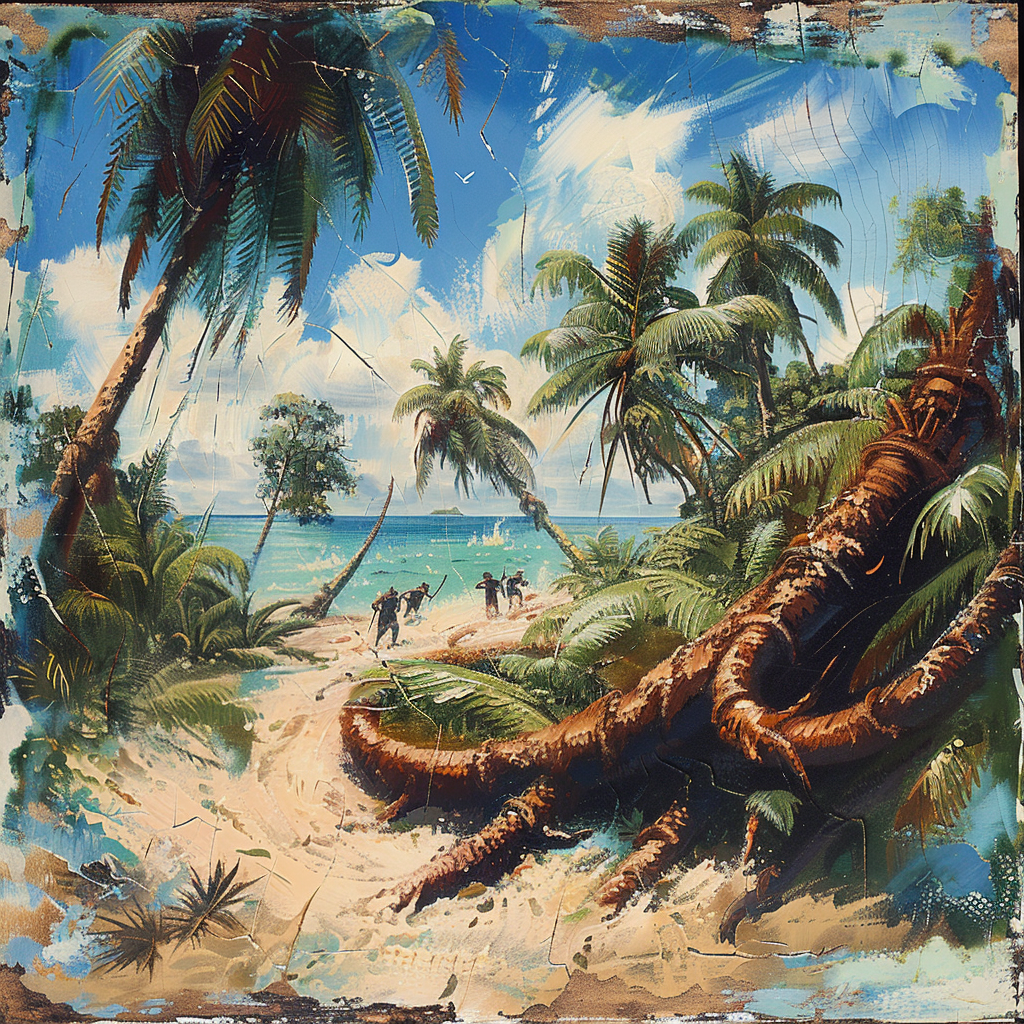
Puccio’s voice: “Vadino! Vadino, come here!”
Vadino shakes his head, approaches him. “What is it?”
“Look,” the comitus tells him. “Dragon trees,” he points out a strange tree, twisted with aerial roots, a trunk that seems swollen and fat branches sprawled out like claws of a big buried beast pointing upwards. “They make Dragon’s Blood from these!”
Vadino doesn’t seem impressed. Puccio insists, taking a hold of his wrist. “But Vadino, don’t you understand, we’ve found a treasure! Our luck has finally turned!”
Vadino turns to his stone towers, makes a gesture with his hand. “You stay here with ten men and the convicts, I’ll take the other five and go explore up there. We’ll meet again down at the camp.” Puccio nods, his eyes illuminated by the discovery and the money they could make. Dragon’s Blood is an ailment the nobles in Europe are ready to pay a fortune for. He calls ten sailors and the convicts to him, signals them to prepare blades, axes, and skins.
IV
Puccio’s men are bustling about. They have already made deep gashes in several Dragon Trees, but there are still many left. “Shouldn’t this stuff be purple? And why does it stink so?” asks a sailor.
“And how should I know. It probably turns red when they cook it, and maybe the smell goes away.”
“It sure does stink,” the man says, wrinkling his nose with his eyes on the greenish and viscous liquid.
Suddenly they hear a shriek. It comes from the direction Vadino and his men went. Puccio springs into action, calls the others, signals them to follow him and takes off at a run with a knife in hand to see what has happened. A whisper sweeps through the forest.
An agile and fast sailor runs ahead of him, they make their way through the trees. The others follow, he hears their heavy footsteps, their labored breaths. Then the lanky man before him lets out a yell.
Puccio catches up and sees him pointing at the ground with his mouth—few teeth there—wide open.
At first, Puccio doesn’t understand what the reddish object at his feet is, it looks like a snake with its tail cut off. Then he realizes: it’s an arm. Puccio summons the men and they venture further. It’s not dragon blood that stains the rocks. It’s just blood. There are fragments of clothes, a knife, a shoe. Little else.
They belong to their companions, Vadino’s men.
“Vadino!” Puccio cries out. “Vadino, where are you?”
He proceeds among the twisted plants, over the black rocks. There are more streaks of blood. His men grip their daggers and advance hunched over, the convicts are with them and have their axes ready, yet there is silence.
From behind, a voice asks Puccio: “There are savages, they got them…they ate them!”
Puccio silences him. “Vadino!” he calls again, loud and yet under his breath, panting.
Then he sees Vadino’s stiletto, stained with blood that is not blood but a dark green sap. Puccio bends down, picks it up. He wrinkles his nose, hit by a pungent stench.
Then the trees around them start to move.
V
Few terrified survivors return to the beach where they landed on the island, where their companions await, alerted by the screams from the forest. They are bloody and wounded and certainly fewer than those who left an hour ago. They shout, cry, beg to leave immediately towards the open sea; a voice among many screams: “It’s cursed! The island is cursed!”
“What are you saying, Puccio?” Ugo looks at him, incredulous, sees his skin covered in wounds. From a blade? A whip? Puccio shakes his head, opens his mouth but cannot speak. The comitus’ eyes don’t even seem to see his captain.
“Savages…you were attacked. The island is inhabited!” Ugo turns to the crew: “Arm yourselves! And let’s go get our men back! May a bunch of savages ever prevent us from passing. Tano! I need you. I need to ask you a hand to search for Vadino.”
Tano nods. He takes the bundle brought from the ship and unrolls it. A large crusader sword appears in his hands.
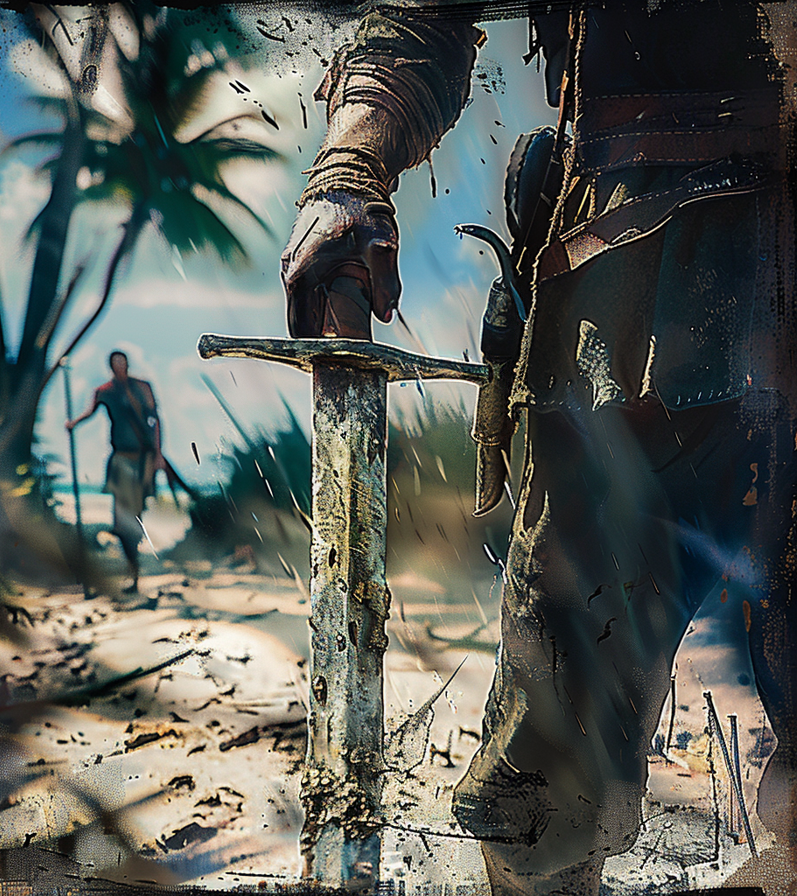
The hilt is entirely metal, the handle wrapped with a black cotton rope, decorated with golden carvings and with a red enameled cross; the pommel bears the embossed engraving of the red cross.
On the steel blade stand out the silkscreens of a knight with a spear and shield in the act of attacking.
Ugo ventures into the forest, fearless and imperturbable, he thinks that the sailors are a bunch of superstitious whiners.
He advances with Tano, leading a group of men armed to their teeth.
A stench, a smell of rot reaches his nostrils, he continues to advance but the pace of his steps decreases. He hears a noise, a rhythmic sound, like someone chewing loudly. Something is wrong, the tracks on the ground are wrong, leaves and sandy soil mixed with liquid pulp overlap. He advances, slowing down even more, now the smell has worsened, wrapping every breath with a sensation of repulsion. He sees vermillion streaks on the leaves, blood. In front of him is a massacre of bodies, pieces of bodies, broken bones, more blood.
“Cannibals…be on guard and cover your backs,” Ugo orders.
There is the body of a man hanging, with a broken skull, a round hole in the back of his head from which a gray pulp comes out. That branch is badly bent, it is unnatural, almost distorted. And the corpse hanging from the branch has its nape on the chest side. Did they twist his head?
Suddenly the whole forest around him moves, the ground beneath his feet shudders, the sand moves—quicksand?
Ugo tries to figure out what is happening.
The monstrous tentacle hurls itself towards him with a fluid and sinister movement, its claws sharp as blades ready to tear flesh. Ugo grabs his stiletto in one hand and his dagger in the other, preparing to repel the monster’s attack. Tano and the others are there with him and their eyes cannot explain what they see. Ugo manages to wound the tentacle before being hit on the arm. Dark green sap gushes from the wounded tentacle, staining and filling the ground with a nauseating stench. The Dragon Trees, their tentacle-like protuberances that only mimic branches, twist and bend, wrapping the sailors like steel snakes. Their slippery surfaces trap the victims, clenching around their bodies with a deadly grip. A macabre fusion of rotten wood and decomposing flesh releases a palpable evil.
From those outgrowths, their mouths open in monstrous creases, revealing small teeth as sharp as nails.
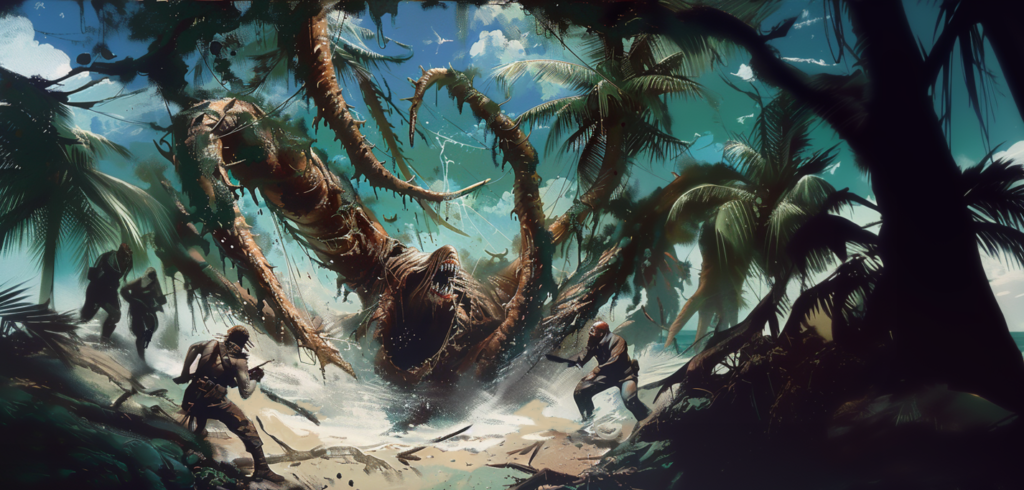
The leathery leaves, like jagged spears, vibrate in the air with whistles and pops. A hideous dance unfolds, as the tentacles twist like hungry claws, trying to tear human flesh with unheard-of ferocity.
The fight is fierce and chaotic. He parries the attacks with skill and speed, trying to find a gap to strike. But the overwhelming strength of the monster is frightening and the tentacles seem to have no end.
As Ugolino defends himself, the noises of his companions echo around him. Screams of terror and cries of pain mix in the air. It’s a dissonant chorus of despair, a sound that pushes him to fight even harder.
The tentacles assail him from every direction, he moves fast. They wrap around his body, trying to drag him towards the monster’s hungry mouths, hideous protrusions of rotting flesh, but he proves unflakable as he fights for his life.
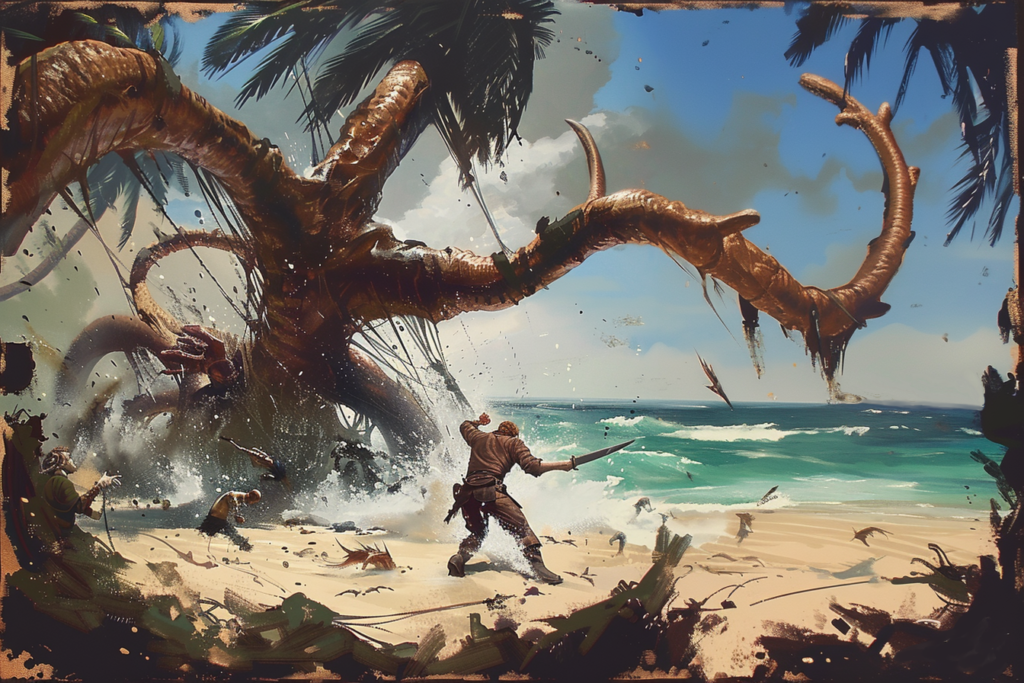
With a series of rapid and precise movements, Ugolino aims his dagger at one of the tentacles that has grabbed him, hitting the monstrous flesh with force again and again. The tree emits a harsh moan of pain and Ugo is suddenly free, he rolls away, while the tentacles continue to attack, delivering powerful blows against him. They seem to be one entity but act separately. To Ugo’s astonished eyes, it seems like a mass of many plant pieces in which human parts are embedded.
The fight becomes a deadly dance, with Ugo dodging, parrying, and counterattacking, trying to hold back the monster. As the cutting sound of blades and wails of anguish fill the air, Ugolino focuses on his mission: to defend himself and, if possible, save his men. The sailors, trapped by the ruthless tentacles, struggle desperately to free themselves. The monsters show no mercy. Tightening their grip ever harder, they sink into their flesh, tearing pieces and causing screams of agony and terror, leaving bloody grooves on their skin.
The air is pervaded by the sound of breaking bones, of tearing flesh. Blood sprays from the open wounds, just like the reddish resin they themselves were seeking shortly before in the trunks, creating a sinister choreography of horror.
The surrounding ground is a chaos of movements and noises. Every now and then, a heartbreaking scream rises above the others. Despite their toughness and courage, Ugo is aware that the number of his companions is dwindling, that some of them are running away in panic or fighting with a faint hope of surviving.
Suddenly the captain sees Tano motionless. His ancient sword in his hands, still, his gaze lost staring at the tentacular branches and the axes of the men caught in their endless macabre ballet.
The huge cook is remembering: frozen images of the last battle—the disaster. In one ear the screams of his companions on the Ocean island echo, in the other ear the swords clashing in the middle of the plain of Tripoli and in the background all the phrases they told him when he returned to Lucca, home, after the exile in Cyprus, after wandering in the Mediterranean. He only wanted to go home, to escape from the horror of a war he could not explain, an unjustifiable war, a theater where he was both spectator and protagonist, gloomy, macabre but real. “Coward!” some yelled at him. “You had to resist and die with the others!” “How many infidel dogs have you killed? Tell us how you slaughtered them!” others asked him with murder in their eyes. Until he could not take it anymore and decided to go far away. Away from there. In the middle of the sea, in the middle of nothing.
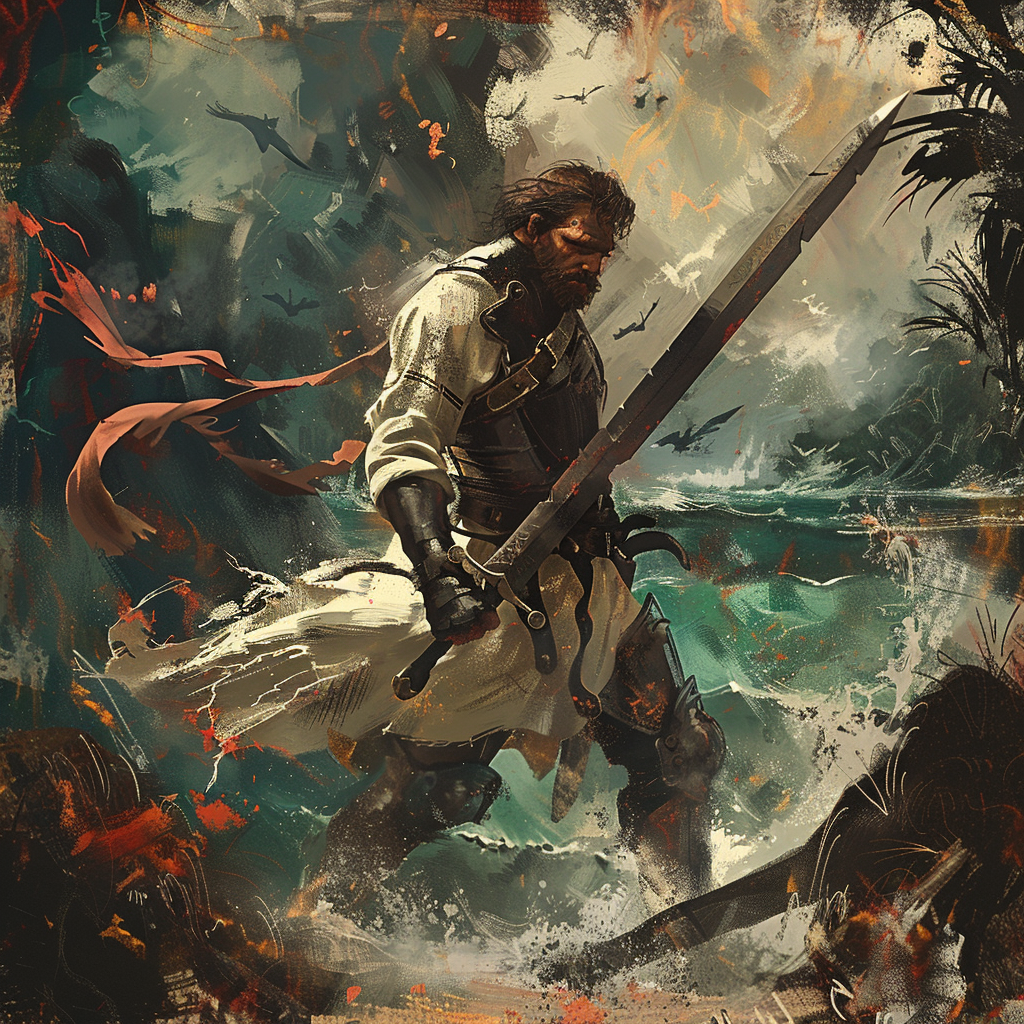
“Tano! Tano!” someone is calling him. It’s the voice of the captain, Ugo’s voice, where are they? Tano suddenly recovers, a sharp pain in his temple. Where is he? The island! The island they landed on! What’s happening? He smells blood, it gets into his left eye, dries quickly, he sees branches, tentacles? They are all around them. He focuses. He hears the sound of broken lives and surrounding horrors. It’s a grim symphony but he doesn’t let himself be disheartened and starts fighting with every fiber of his being, fighting the horror that has swallowed them.
Shouts, screams of pain, of fear. Tano wields his sword and deals blows left and right. With precision. He feels the sword his friend. Too much time spent together to forget how she works. It’s a man-steel alliance against an enemy with dark green blood.
Tano knocks down the tentacle branches that come close to him, his movements are a little slow and he feels his muscles pulling, he is out of training but he does not stop. He hears a scream. Where is the captain? He sees him wounded, in danger, so he approaches, is behind him. “I’m here!” he yells.
He fights back to back with his captain, like a tiger he repels all the attacks of those slimy, putrid branches. Splashes of their greenish sap hit their skin. It stinks of rot. At least it doesn’t seem poisonous. Tano hears Ugo breathing hard, so he turns around and sees that he has been wounded in the left shoulder, above the heart. The captain’s shirt is brown purple. The color of his blood mixed with the green of the monsters’ sap.
He throws himself forward and, with a swipe of his arm, knocks Ugo to the ground just before another blow from the tentacle branch slit his throat, instead it meets Tano’s steel and cuts in two. The monster whistles, it’s unclear if from pain or disapproval or anger. Tano doesn’t care, he continues to wreak havoc on that thing and advances towards it. He attracts the attention of another one of those beasts, busy swallowing the torso of a convict and now he has two to keep at bay.
“Go away Ugo! Go away!” Tano yells.
Ugo manages to drag himself away, in pain but on his feet. Stumbling on the ground he looks around, but sees only pieces of bodies and pieces of tentacles. The ship is the only hope to get out of this hell. He turns doubtful, he would like to help him. And he sees Tano leaning with all the weight of his huge bearded body on the hilt of his sword, piercing the enemy’s trunk. He has an ecstatic grin. His chest, his legs, are a sieve. He has holes everywhere, the tentacles are eating his flesh, from the inside.
VI.
Ugo escapes as best he can, limping from his numerous wounds. He has found no trace of his brother. Or perhaps some streak of blood was all that remained of Vadino. The survivors are a handful, fleeing across the cursed island. They hear a tremendous roar, seemingly coming from the depths of the earth itself. The ground beneath their feet begins to vibrate violently, as if it were breathing.
They reach the beach where the others wait.
“To the boats! To the boats!” Ugo cries.
Puccio does not need to be told twice. He felt the roar too well, coming from the ground beneath him, and does not want to see what it is.
Suddenly, the earth begins to open beneath their feet.
The frantic run comes to an abrupt halt. The island, which seemed solid and stable, now reveals its true nature. And it is clear now that their attempt at escape serves little purpose.
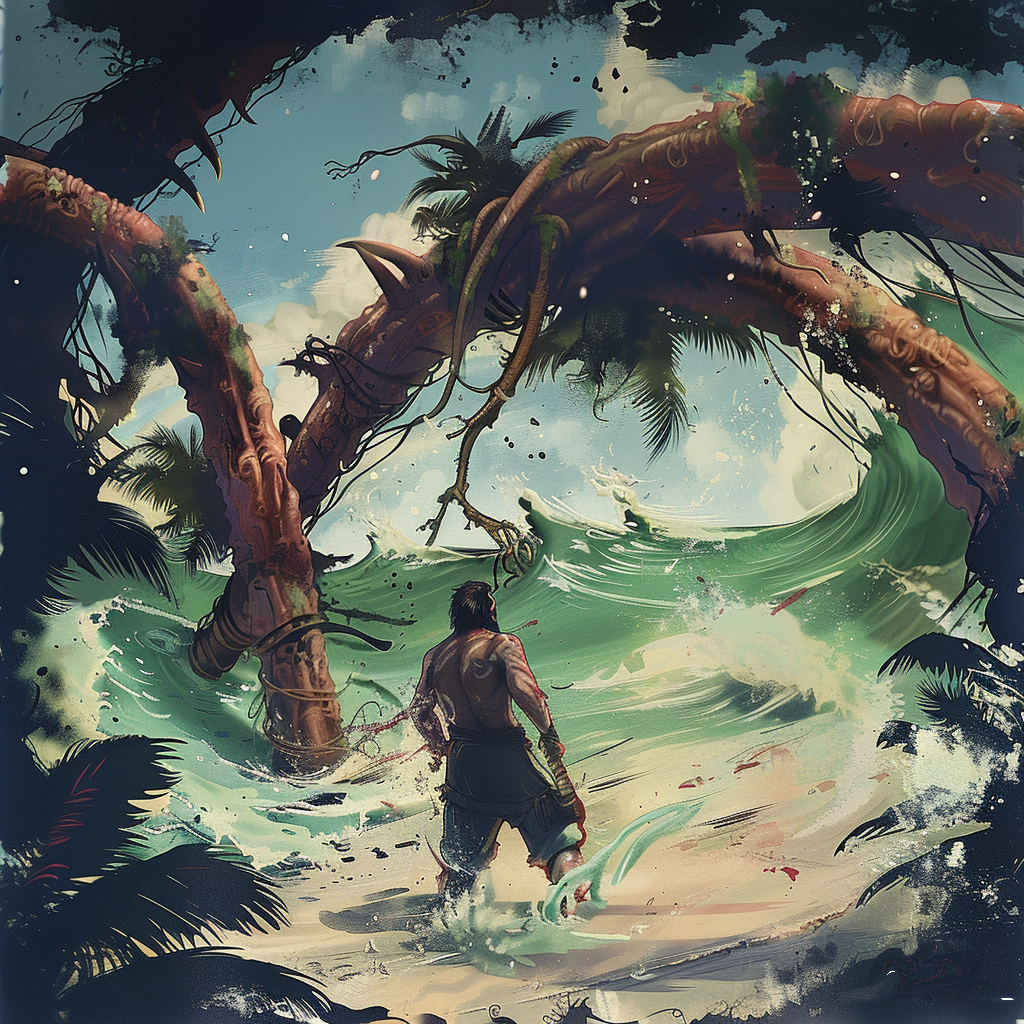
The roar echoes through the wide-open, hungry mouth, like a massive belch in preparation for a new feast.
Two flaps of the island rise to the east and west, pointing high, towards the clouds, obscuring the sky. Ugo and Puccio, kneeling on the unstable ground, watch the blue sky disappear above their heads. A warm sensation of oppression and claustrophobia creeps into their souls and they realize they are trapped in a living prison: the immense maw of a sea creature that is the whole island. Rocks, sand, real trees and monster trees rain down on them, in an endless fall into an infinite abyss. The wounds no longer matter, survival and fighting no longer matter. Ugo lets himself go, enveloped by saltwater and island, he finds himself smiling, surrounded only by dense air and the unfathomable depths of the Atlantic Ocean.


